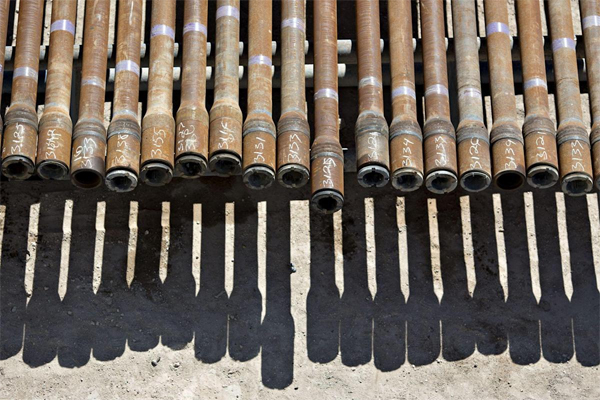- Court order blocking climate policy may slow permits, leases
- Analysts see gasoline topping $4 a gallon in U.S. on tensions

Jennifer A Dlouhy and Ari Natter, Bloomberg News
WASHINGTON
EnergiesNet.com 02 23 2022
The Biden administration has delayed issuing permits for new oil and gas drilling on federal land, a move that could complicate efforts to tame gasoline prices that are poised to top $4 per gallon amid the Russia-Ukraine conflict.
The Interior Department of delays in new drilling permits after a Louisiana-based federal district judge blocked the administration’s method for assessing how its permit approvals affect climate change.
“To have your judicial system and regulatory branch trying to throttle oil and gas production while you’re scrambling to look under every rock around the world for a barrel of oil is awkward and contradictory,” said Bob McNally, a former White House official who heads Rapidan Energy Group, a Washington-based consulting firm.
Some officials were confident the move would have a minimal short-term impact on domestic oil and gas production in part because drillers already have thousands of unused permits they can tap, said a person familiar with the matter who asked for anonymity to speak candidly about government discussion.
So far, US oil companies have been reluctant to pump more, preferring to steer record cash flows back to investors instead of spending it on new drilling that could flood the world with cheap crude but also stoke another boom-and-bust cycle.
That could change with oil prices hovering around $100 a barrel, said Kevin Book, managing director of research firm ClearView Energy Partners. “Oil and gas producers buy leases as options, not obligations,” Book said. “As we close in on $100 a barrel it is a safe bet that those leases are going to get used.”
Oil and gas permitting on private land is not affected, and Interior regulators were still reviewing applications for permits to drill on Tuesday, said an agency representative who asked for anonymity to discuss the activity.
In a legal filing Saturday, the Justice Department said “work surrounding public-facing rules, grants, leases, permits and other projects have been delayed or stopped altogether so that agencies can assess and how they can proceed” in the wake of the court’s ruling. The Interior Department warned that “delays are expected in permitting and leasing for the oil and gas programs.”
Oil prices have been climbing amid intensifying tensions with Russia, a top producer of crude, and heightened the risk that sanctions or retaliation by Moscow could disrupt those flows. Futures in New York traded near $93 a barrel while Brent traded around $97 Tuesday.
The price of a gallon of unleaded gasoline averaged $3.53 nationwide on Monday, according to auto club AAA, a level last seen in 2014. Unleaded gasoline is already fetching more than $6 at least one California station, and it is on track to exceed $4 on Average nationwide in coming months, fed by seasonal demands, increases refinery issues and uncertainty around Russia, said Patrick DeHaan, head of petroleum analysis at GasBuddy.
And there’s little President Joe Biden can do about it, DeHaan said. “We have to get rid of this notion of the president has some sort of magic wand” when it comes to gas prices.
Administration officials have already asked OPEC+ producers and domestic drillers to increase their output, sought a probe of alleged oil industry collusion and even tapped the nation’s emergency stockpile of crude, but the interventions have had only limited impact.
Biden said he was coordinating with oil producers to secure stability in global energy supplies.
“This will blunt gas prices,” Biden said Tuesday from the White House. “I want to limit the pain the American people are feeling at the gas pump. This is critical to me.”
The administration already has authorized the release of 50 million barrels of crude from the Strategic Petroleum Reserve — with 40 million already committed in loans and sales. Another release from the reserve remains an option, especially if Russia shuts off its flow of crude oil exports to the US
But the reserve is a limited resource, and analysts said Biden can’t afford to tap it frequently. Not only is its capacity limited to about 714 million barrels, the US is obligated to hold on to much of the stockpile for emergency disruptions.
Other options under discussion could help shave pennies off gas prices and, perhaps just as important, communicate to voters that the administration is seeking to blunt their pain.
That includes suspending the 18.4 cents-gasoline-gallon federal tax on, an idea under consideration by the White House and congressional Democrats. But analysts say the measure doesn’t appear to have the requisite congressional support and would likely backfire retail anyway — resulting in extra profits forers rather than a durable decrease in pump prices.
The administration also is under sustained pressure to reinstate limits on exports of US crude, even though the move could discourage domestic production.
“The administration has learned by now the only real options are all bad and they come in two categories: nothingburgers and mistakes,” Rapidan’s McNally said. “There is not a lot they can do. That’s just the reality of it.”
Republicans and oil industry leaders accused the administration of needlessly discouraging production.
“Biden is signaling that his environmental goals trump energy security and consumer prices,” said Dan Eberhart, chief executive of oilfield services company Canary Drilling Services. “That’s not lost on public companies or the banks they rely on.”
bloomber.com 02 23 2022












